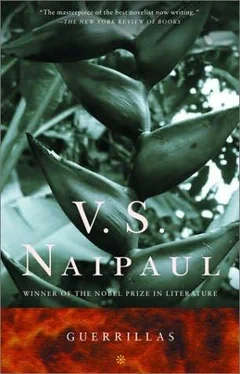V. Naipaul - Guerrillas
Здесь есть возможность читать онлайн «V. Naipaul - Guerrillas» весь текст электронной книги совершенно бесплатно (целиком полную версию без сокращений). В некоторых случаях можно слушать аудио, скачать через торрент в формате fb2 и присутствует краткое содержание. Год выпуска: 1990, ISBN: 1990, Издательство: Vintage, Жанр: Современная проза, на английском языке. Описание произведения, (предисловие) а так же отзывы посетителей доступны на портале библиотеки ЛибКат.
- Название:Guerrillas
- Автор:
- Издательство:Vintage
- Жанр:
- Год:1990
- ISBN:978-0679731740
- Рейтинг книги:5 / 5. Голосов: 1
-
Избранное:Добавить в избранное
- Отзывы:
-
Ваша оценка:
- 100
- 1
- 2
- 3
- 4
- 5
Guerrillas: краткое содержание, описание и аннотация
Предлагаем к чтению аннотацию, описание, краткое содержание или предисловие (зависит от того, что написал сам автор книги «Guerrillas»). Если вы не нашли необходимую информацию о книге — напишите в комментариях, мы постараемся отыскать её.
Guerrillas — читать онлайн бесплатно полную книгу (весь текст) целиком
Ниже представлен текст книги, разбитый по страницам. Система сохранения места последней прочитанной страницы, позволяет с удобством читать онлайн бесплатно книгу «Guerrillas», без необходимости каждый раз заново искать на чём Вы остановились. Поставьте закладку, и сможете в любой момент перейти на страницу, на которой закончили чтение.
Интервал:
Закладка:
“Do you think Harry will manage in Toronto? He’s all right here. But he doesn’t really know what business is. They will chew him up up there.”
“A man like Harry will get on anywhere. You’ll be all right too. You’ll just make a fresh start, in spite of what Meredith says.”
“You think so?” she said irritably, and looked out of the window.
He could see it so clearly. That irritation, that looking out of the window, enabled him to see it so clearly: her instinctive display, an extension of her display now, in the car, against this alien background of bush. He could see how the past few months could be reduced to another episode of betrayal and violation. He could see the irritability, the brightness, the hysteria, the reaching out toward the new person that would seem so wholehearted, so final, so full of flattery for that new person: the reaching out that would yet conceal her own certainties, would be without risk, and would commit her to nothing.
He said, “London awaits. You’ve huffed and puffed, but you’ve always known you’d never blow it down. If you knew you were really going to blow it down you’d be very frightened. Don’t you think a man like Meredith understands that? Are you really so surprised by his attitude?”
“I’m not interested in what Meredith thinks.”
The road was turning toward the sea again, and the cocoa-and-coffee woods had given place to bush, the yellowing bush of a treeless swampland. The shallow ponds had dried down to hard, cracked mud.
Roche said, “I suppose Meredith’s being brave. This place can be blown down, and this place is all he’s got. He sees what you and I see. Every day he’s got to reconcile himself to it.”
An iron bridge, painted silver, spanned a slow river that flowed between mangrove. The river, reflecting the mangrove, was yellow-green. The level of the water had fallen; the exposed thickets of mangrove roots were hung with shreds of old slime that had dried to the color of dust. Between massively bolted girders the car rattled over the planks on the bridge. The sunlight fell yellow on the yellow-green water, crisscrossed by the shadows of the girders. And momentarily, driving down the embankment from the bridge, seeing the shallow creeks the color of rust that flowed into the river they had just crossed, getting some idea of a primeval landscape, sun and slime, heat and vegetable decay, momentarily Roche had a sense of desolation.
He said, “It’s funny how they talk about their childhoods here. Jimmy, Meredith. As though it’s so far away. As though it belongs to another century. And as though they’ve just found out about it.”
The land flattened, the road entered a coconut plantation. And all at once it seemed to be late afternoon. The road was narrow, a crust of asphalt and gravel on the sand. The gray trunks of the coconut trees were very tall and curved. There were so many of them and they were set so regularly that from the car they seemed to be moving, crisscrossing the band of bright sky and the long, low, muddy breakers, white in the afternoon light, to which the eye was led beyond the debris of the coconut plantation: dead palm fronds, brown and shining, coconut husks in heaps, yellow-green nuts awaiting collection. It would photograph well. The camera would get everything, even the muddy olive color of the stripe of sea beyond the breakers, even the yellow froth on the beach. It wouldn’t get the desolation: the desolation they had driven through to arrive at this spot, the desolation of the late afternoon, the idea of darkness and the end of the day, the desolation of the dim lights soon to come on in the white-washed hutments of the plantation workers.
Every coconut tree was numbered in black; many were ringed with an orange-colored blight-deterrent. And the plantation continued.
Roche said, “No wonder they talk about their childhoods. It is here, waiting for them. When you look at this you feel you’ve gone back fifty years.”
It was not a beach for bathing. But here and there in the sand, in safe places away from coconut trees and falling nuts, there were old cars, with open doors, and small groups of people. Poor people: ugly girls from poor houses with all their girlish instincts: other people’s pleasures, hopes, gaieties. Other people’s Sundays: Jane thought of Harry’s beach house, empty on the cliff; she thought of darkness falling on the estuary. She thought of darkness coming to their house on the Ridge. The coconut trees crisscrossed in the gloom; the far-away sea glinted in the afternoon light. Her fatigue and irritability began to be replaced by fear. It was not defined; it was fixed on nothing in particular; but it had been maturing all day. She decided that the time had come to leave: escape was urgent.
Roche took off his dark glasses, unnecessary in the coconut gloom. She glanced at him. She saw distress in his eyes.
She said, “It must be hard for you.”
He said simply, “Yes, it is hard. On a day like this.”
They passed a rough little wooden stall beside the road. A whole family sat or stood around the stall, obviously their own, which offered a few vegetables and bright, speckled fruit. And not long after they passed a group of strolling women who wore pink and blue plastic curlers, and some men who wore short khaki trousers and nothing else.
Roche said with sudden passion, “I loathe all these people. I hate this place.”
Her own irritability and melancholy vanished. She had known him calm, ironic, sarcastic: saint and satyr, hard to pin down. Now, extending sympathy to him, she had drawn out of him something like a child’s rage. She saw the veins on his temples, the set of his mouth; and, driving through that coconut gloom, with the line of sky and sea far to their right, for the first time she was nervous of him.
He said, “But, as you say, Sunday’s a bad day. It will be all right in the morning.”
This was more the manner she was used to: his saint’s manner, as she thought of it, in which everything had an explanation as satisfying as an excuse, and everything, every new experience, every new fact or perception, was absorbed into a private system that kept him calm and aloof. His face relaxed, became again the ascetic mask she knew. Her nervousness abated; but she remained disturbed by him.
There was a break in the coconut trees. Sunlight spattered the road, lit up a small settlement of weathered wooden houses set in sand that had turned gray from the rotted shreds of coconut fiber with which, over the years, it had become mixed. After that the coconut planting was irregular, and the trees were not numbered. A white wooden bridge, a shallow reddish creek; and then they were out of the plantation, and again in the bright light of the afternoon.
Jane said, “You must get that man off my back.”
“Who?” Roche put on his dark glasses.
“Jimmy. Endless telephone calls.”
He didn’t react.
“I don’t know what Adela must think. And when you answer he always wants you to telephone back in five minutes at some new number.”
Roche smiled. “That’s Jimmy. He likes to make it appear that somebody is telephoning him. He always gets a telephone call when he comes to see me in the office.”
“I went to see him one lunchtime at the Prince Albert. That seemed safe enough. He said he was talking to the Lions.”
“The Lions don’t meet at the Prince Albert. He took a chance there. But with Jimmy there’s always some stupid little giveaway like that.”
“He turned up in a great big American car with a driver.” She saw that Roche smiled, and her tone went lighter. “A fat black driver wearing a see-through blue nylon shirt and one of those knotted vests.”
He almost interrupted her. “What did Jimmy have to say?”
Читать дальшеИнтервал:
Закладка:
Похожие книги на «Guerrillas»
Представляем Вашему вниманию похожие книги на «Guerrillas» списком для выбора. Мы отобрали схожую по названию и смыслу литературу в надежде предоставить читателям больше вариантов отыскать новые, интересные, ещё непрочитанные произведения.
Обсуждение, отзывы о книге «Guerrillas» и просто собственные мнения читателей. Оставьте ваши комментарии, напишите, что Вы думаете о произведении, его смысле или главных героях. Укажите что конкретно понравилось, а что нет, и почему Вы так считаете.












